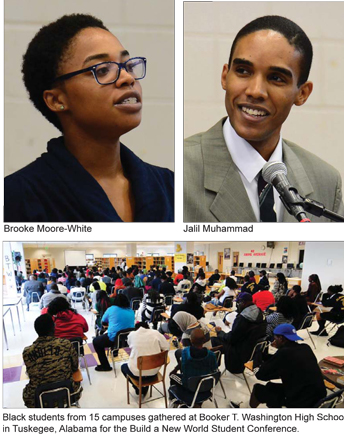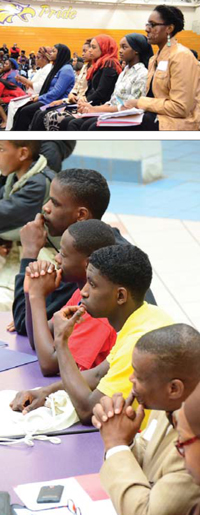Black college students plan, organize for new world
By Charlene Muhammad -National Correspondent- | Last updated: Oct 22, 2013 - 11:08:48 PMWhat's your opinion on this article?

|
Among the many colleges, the students traveled from Tuskegee University, Alabama State University, Howard University, Spellman, Morehouse, Clark Atlanta, Prairie View University, and the University of Arkansas at Pine Bluff.
Brooke Moore-White, a graduating senior at Tuskegee University, welcomed her peers to the day-long event, which was a highlight of activities during the Nation of Islam’s 18th Anniversary of the historic 1995 Million Man March and Holy Day of Atonement.
“Today is a beautiful day! Today, we are building our new world. We are building a place that is connected to love and peace and not bound to the ills and perils of the past,” Ms. Moore White said, as she swiftly opened the highly-anticipated program.
Admission to the conference was free and the information and knowledge shared between the vibrant, intelligent students and guest panelists were priceless.
They convened to pool their resources and intellectual power to address the problems facing themselves, their community and nation.
They gathered by invitation of Minister Louis Farrakhan and under the diligent coordination of Jalil Muhammad, a Howard University graduate and coordinator of the Nation of Islam Student Association at Howard University.
“Don’t take yourselves lightly because no one else does. They understand your power and that’s why they keep you intoxicated,” Jalil Muhammad told students.

Photos: Mikal Veale/ChoiceImagery
|
“They say college is the time to party and experiment ... But they don’t tell you college is the time where you are being viewed by society and the government as the most dangerous. Students are dangerous. Not because you carry weapons. Students are dangerous because you have time. Time to do what? You have time to think. You have time to study. You have time to read,” he continued.
“Time to think is very special because ultimately the fear is Black students will have time to think their way out of the quagmire society has placed them in,” said Jalil Muhammad.
Student Minister Ishmael Muhammad welcomed the young leaders on behalf of Minister Farrakhan by underscoring the purpose for education.
“It is for self-cultivation, to teach how to give proper service to self, family, community, nation, and then to the world. There’s nothing wrong with wanting to be rich and get paid,” he told the students, “but the sole purpose of financial gain compromises what God really intended because of the attraction of money,” he said.
“We must look at the problems of our people and community and become more deeply convened over its current state and know that the Honorable Elijah Muhammad taught us no one man or woman can rise above the condition of his people,” said Min. Ishmael Muhammad.
He set the tone for the conference by encouraging the students to have gratitude. “Express appreciation because you would not be here. I would not be here. You can never be anything in life without somebody. You can’t get through life without the aid and the assistance of somebody in your life,” he added.
It was no accident that Minister Farrakhan called them to Tuskegee he continued.
“We’re here today because of Booker T. Washington. We’re here today and we thank God for Frederick Douglass and Nat Turner. We can’t forget W.E.B. DuBois and Sojourner Truth and Harriet Tubman and we can’t forget Marcus Garvey and Noble Drew Ali and Paul Robeson. And we can’t get Malcolm X and the Honorable Elijah Muhammad and Dr. Martin Luther King, Jr. and Stokely Carmichael or Kwame Ture and we can’t forget Medgar Evers, Fannie Lou Hamer,” he encouraged.
“We can’t forget all of the freedom fighters that paid a tremendous price to free us and put us in a better position in a racist and oppressive society that this society and this government and this people would just respect our basic human rights as a people,” Minister Ishmael continued as the students burst into applause.
The conference featured esteemed panelists, including: Dr. Abdul Alim Shabazz, Attorney Malik Zulu Shabazz, of Black Lawyers for Justice and the New Black Panther Party, Student Minister Nuri Muhammad of Muhammad Mosque No. 74 in Indianapolis, Sasasha Fleming, Chief of Staff for the Collegiate Chapter of the NAACP, Terrence Muhammad of Hip Hop Caucus, Brooke Moore-White Tuskegee University student, Dr. Greg Carr, Howard University professor, Dr. Muhjah Shakir, Dr. Frederick Douglass Dixon, professor at Kennedy King College, Dr. Lisa Bratton, Tuskegee University assistant professor of History and Donnie Muhammad, a Raleigh, North Carolina businessman who sponsored several buses for students from several universities to attend the conference.
The opening session titled, “Organize, Organize, Organize,” focused on how to organize and maintain a student-based movement in the 21st Century. Panelists discussed the importance of utilizing education in activism. They also shared real-world experiences to show the students why and how they should become active in the movement and where education and economics fit in.
“Proper Education for the Black Student to become the architect of a New World,” delved into the impact of mis-education, where to find the truth, and how to put what they learn into action.
According to Dr. Shabazz, part of the problem is most people believe the notion that there’s an achievement gap between Blacks and Whites but it just doesn’t exist. The gap is based on a lie and upheld by a system of education utilized to maintain White supremacists false ideas.
Khabir Muhammad, a Computer Science major at Morehouse, hoped more students could have attended because he said the conference was very essential to improving the plight facing young Black adults.
“Well, the right people with the right hearts showed up today. In this case, less is more. I’m enjoying being here. Thoughts lead to ideas, which lead to vision. This conference is a step forward,” he added.
Antoine Coleman, Jr., who is studying history, said what he learned was interesting and valuable. “I think it was to bring about the change that needs to take place, particularly with the inequality within education,” he said. “You have to know your history in order to know what changes you need to make,” he added.
Cameron Clarkson, a senior Political Science major from Howard University said he highly anticipated the conference. He said a debate broke out on the bus in a hard to sleep moment at 2 a.m.
The issues were action versus planning. One student championed planning and argued Dr. Martin Luther King, Jr. used that framework to progress the movement.
Another student countered and said the Student Nonviolent Coordinating Committee used grassroots action with students defying White-only lunch counters by risking their lives.
The two sides eventually arrived at the realization they needed both and looked to the conference guidance and resources to achieve both.
“This conference has to be the collection of action and planning because back there up in D.C. in the battlefield, we saw the government shut down first hand but we also see the poverty. We also see the food desert. We see the pain and suffering that our people go through on a day-to-day basis. This is a war,” Mr. Clarkson said.
(Melanie Muhammad and Tariq Muhammad contributed to this report.)
INSIDE STORIES AND REVIEWS
-
-
About Harriett ... and the Negro Hollywood Road Show
By Rabiah Muhammad, Guest Columnist » Full Story -
Skepticism greets Jay-Z, NFL talk of inspiring change
By Bryan 18X Crawford and Richard B. Muhammad The Final Call Newspaper @TheFinalCall » Full Story -
The painful problem of Black girls and suicide
By Charlene Muhammad -National Correspondent- » Full Story -
Exploitation of Innocence - Report: Perceptions, policies hurting Black girls
By Charlene Muhammad -National Correspondent- » Full Story -
Big Ballin: Big ideas fuel a father’s Big Baller Brand and brash business sense
By Bryan Crawford -Contributing Writer- » Full Story






 Click Here Stay Connected!
Click Here Stay Connected!








